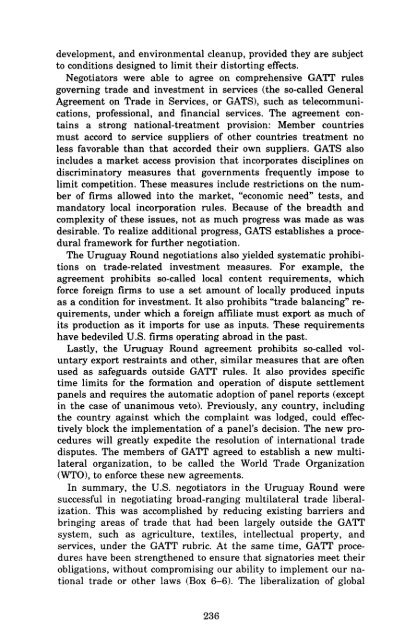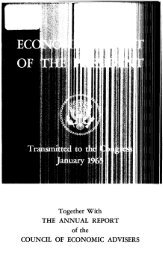- Page 1:
S : Sf:' ;: W^W't-^WW': ;, S 4 Si :
- Page 5:
unitedminds
- Page 9 and 10:
Economic Report of the PresidentTo
- Page 11:
the Technology Reinvestment Project
- Page 14:
formed health care system, increase
- Page 19 and 20:
CONTENTSPageCHAPTER 1. A STRATEGY F
- Page 21:
PageProviding Comprehensive Benefit
- Page 24 and 25:
LIST OF CHARTS—CONTINUEDPage3-5 L
- Page 27 and 28:
CHAPTER 1A Strategy for Growth and
- Page 29 and 30:
which have left consumers and busin
- Page 31 and 32:
that growth in both real compensati
- Page 33 and 34:
for inflation was on average roughl
- Page 35 and 36:
Box 1-2.—Saving, Investment, and
- Page 37 and 38:
investments in human capital; inves
- Page 39 and 40:
of the income distribution (Table 1
- Page 41 and 42:
Box 1-3.—Credible Deficit Reducti
- Page 43 and 44:
Chart 1-7 Correlation of Investment
- Page 45 and 46:
Box 1~4*~-A Balanced Budget Amendme
- Page 47 and 48:
This educational record is not good
- Page 49 and 50:
fallen markedly since the 1960s (Ch
- Page 51 and 52:
The development and deployment of n
- Page 53 and 54:
Earlier rounds of GATT talks had fo
- Page 55 and 56:
Chart 1-10 Projected Real Growth Ra
- Page 57 and 58:
are therefore on the public dole. M
- Page 59:
prise communities and be granted sm
- Page 62 and 63:
ingredient that should allow the ec
- Page 64 and 65:
Chart 2-2 National Defense Purchase
- Page 66 and 67:
Chart 2-3 Growth of U.S. Merchandis
- Page 68 and 69:
Chart 2-5 Households: Credit Market
- Page 70 and 71:
THE HEADWINDS ARE MOSTLY CALMINGAs
- Page 72 and 73:
1993, real consumer spending increa
- Page 74 and 75:
RESIDENTIAL INVESTMENTResidential i
- Page 76 and 77:
smallest annual increase in 20 year
- Page 78 and 79:
ments with the Internal Revenue Ser
- Page 80 and 81:
safe-harbor rules for underpayment
- Page 82 and 83:
Chart 2-9 Alternative Measures of t
- Page 84 and 85:
Meanwhile, the Mountain States were
- Page 86 and 87:
inflation is measured by the Blue C
- Page 88 and 89:
Saving, Investment, and Capital Acc
- Page 90 and 91:
the future should be reflected in l
- Page 92 and 93:
Chart 2-15 Dynamic Effects of Defic
- Page 94 and 95:
joyed healthy average real GDP grow
- Page 96 and 97:
Chart 2-16 Personal Income Taxes as
- Page 98 and 99:
TABLE 2-2.— Administration Foreca
- Page 100 and 101:
TABLE 2-3.— Accounting for Growth
- Page 103 and 104:
CHAPTER 3Trends and Recent Developm
- Page 105 and 106:
first quarter of 1991, nonfarm payr
- Page 107 and 108:
cause defense cutbacks have caused
- Page 109 and 110:
UNEMPLOYMENT AND NONEMPLOYMENTThe U
- Page 111 and 112:
Chart 3-3 Civilian Unemployment Rat
- Page 113 and 114:
Chart 3-6 Employment-to-Population
- Page 115 and 116:
Chart 3-8 Ratio of White-Collar to
- Page 117 and 118:
than would be expected given its hi
- Page 119 and 120:
that the natural rate is falling? M
- Page 121 and 122:
SLOW INCOME GROWTHIncome trends hav
- Page 123 and 124:
Chart 3-10 Average Annual Growth of
- Page 125 and 126:
Box 3-3.—Consequences of Producti
- Page 127 and 128:
likely that immigration could expla
- Page 129 and 130:
We do, however, know how many worke
- Page 131 and 132:
size. No data are available on vola
- Page 133 and 134:
BENEFITSOne of the concerns raised
- Page 135 and 136:
edented partnership to develop a nu
- Page 137 and 138:
CHAPTER 4Health Care ReformTHE UNIT
- Page 139 and 140:
make cost-conscious decisions. In a
- Page 141 and 142:
A third rationale for universal cov
- Page 143 and 144:
Box 4-1.—Moral Hazard and Adverse
- Page 145 and 146:
ies depending on one's health statu
- Page 147 and 148:
than people in other countries do,
- Page 149 and 150:
sumers are ill equipped to bring st
- Page 151 and 152:
By itself, the aging of the populat
- Page 153 and 154:
TABLE 4-3.- Sources and Uses of Hea
- Page 155 and 156:
about 65 to 70 cents for a typical
- Page 157 and 158:
THE ARCHITECTURE OF THE HEALTHSECUR
- Page 159 and 160:
etary savings for the Federal Gover
- Page 161 and 162:
contribution, within limits. Outsid
- Page 163 and 164:
salary income, payments from the em
- Page 165 and 166:
TABLE 4-6.—Caps on Premiums by Fi
- Page 167 and 168:
An example will illustrate the proc
- Page 169 and 170:
TABLE 4-9.—Sources and Uses of Fe
- Page 171 and 172:
Chart 4-9 Business Spending on Heal
- Page 173:
Health care reform should set the s
- Page 176 and 177:
and private sectors, addressing env
- Page 178 and 179:
Box 5-1.—Selected National Perfor
- Page 180 and 181:
Box 5-2*—Market PowerFirms are sa
- Page 182 and 183:
ate regulation. For example, State
- Page 184 and 185:
competitiveness of U.S. industry, a
- Page 186 and 187:
Box 5-4.—ExternalitiesAn external
- Page 188 and 189:
in the habitat of the spotted owl r
- Page 190 and 191:
CLIMATE CHANGE ACTION PLANCertain g
- Page 192 and 193: eral, lays a foundation for broader
- Page 194 and 195: The Administration's proposal seeks
- Page 196 and 197: vances in technical know-how have a
- Page 198 and 199: Investments in R&D are risky. Like
- Page 200 and 201: 1950s and 1960s, and American compa
- Page 202 and 203: ico and Lawrence Livermore in Calif
- Page 204 and 205: of industry. MOCs will be affiliate
- Page 206 and 207: tiveness. Again, the hoped-for resu
- Page 208 and 209: forts to cut the massive Federal bu
- Page 210 and 211: TECHNOLOGY POLICY, GROWTH, ANDCOMPE
- Page 212 and 213: mitment to an open international tr
- Page 214 and 215: ses, which take such intersectoral
- Page 216 and 217: An important sectoral development i
- Page 218 and 219: TABLE 6-3.—Stock of U.S. Outward
- Page 220 and 221: technical change has been offered a
- Page 222 and 223: ent account is a broader measure of
- Page 224 and 225: TABLE 6-6.—Intrafirm Trade as Sha
- Page 226 and 227: greater access to the Japanese mark
- Page 228 and 229: the transparency of its trade regim
- Page 230 and 231: that if the states of the former So
- Page 232 and 233: Box 6-3.—Mexican Economic Reforms
- Page 234 and 235: 1998, while nontariff barriers on a
- Page 236 and 237: ward convergence in environmental a
- Page 238 and 239: Box 6-4.—The Asian "Miracle"Per c
- Page 240 and 241: Box 6-5.—The Economic Impact of t
- Page 244 and 245: THE TRADE POLICY AGENDABy lowering
- Page 246 and 247: ignated monopolies. It also establi
- Page 248 and 249: The dollar ended 1993 roughly where
- Page 250 and 251: Box 6-7.—Exchange-Rate Volatility
- Page 252 and 253: Chart 6-5 French Franc-Deutsche Mar
- Page 254 and 255: Besides bringing these endeavors to
- Page 257 and 258: LETTER OF TRANSMITTALCOUNCIL OF ECO
- Page 259 and 260: Report to the President on the Acti
- Page 261 and 262: duction budget package, the North A
- Page 263 and 264: Working Group studying cost-benefit
- Page 265 and 266: prepares the Economic Indicators an
- Page 267: Appendix BSTATISTICAL TABLES RELATI
- Page 270 and 271: POPULATION, EMPLOYMENT, WAGES, AND
- Page 272 and 273: AGRICULTURE:PageB-96. Farm income,
- Page 274 and 275: NATIONAL INCOME OR EXPENDITURETABLE
- Page 276 and 277: TABLE B-2.—Gross domestic product
- Page 278 and 279: TABLE B-3.—Implicit price deflato
- Page 280 and 281: TABLE B-4.—Fixed-weighted price i
- Page 282 and 283: TABLE B-5.—Changes in gross domes
- Page 284 and 285: TABLE B-7.—Cross domestic product
- Page 286 and 287: TABLE B-9.—Gross domestic product
- Page 288 and 289: TABLE B-ll.—Gross domestic produc
- Page 290 and 291: TABLE B-13.—Gross domestic produc
- Page 292 and 293:
TABLE B-15.—Personal consumption
- Page 294 and 295:
TABLE B-17.—Gross and net private
- Page 296 and 297:
TABLE B-19.—Inventories and final
- Page 298 and 299:
TABLE B-21.—Foreign transactions
- Page 300 and 301:
TABLE B-23.—Relation of gross dom
- Page 302 and 303:
TABLE B-25.—National income by ty
- Page 304 and 305:
TABLE B-26.—Sources of personal i
- Page 306 and 307:
TABLE B-27.—Disposition of person
- Page 308 and 309:
TABLE B-29.—Gross sating and inve
- Page 310 and 311:
TABLE B-31.—Median money income (
- Page 312 and 313:
TABLE B-33.—Population and the la
- Page 314 and 315:
TABLE B-34.—Civilian employment a
- Page 316 and 317:
TABLE B-36.—Unemployment by demog
- Page 318 and 319:
TABLE B-38.—Civilian labor force
- Page 320 and 321:
TABLE B-40.—Civilian unemployment
- Page 322 and 323:
TABLE B-42.—Unemployment by durat
- Page 324 and 325:
TABLE B-44.—Employees on nonagric
- Page 326 and 327:
TABLE B-45.—Hours and earnings in
- Page 328 and 329:
TABLE B-47.—Productivity and rela
- Page 330 and 331:
PRODUCTION AND BUSINESS ACTIVITYTAB
- Page 332 and 333:
TABLE B-51.—Industrial production
- Page 334 and 335:
TABLE B-53.—New construction acti
- Page 336 and 337:
TABLE B-54.—New housing units sta
- Page 338 and 339:
Year or monthTABLE B-56.—Manufact
- Page 340 and 341:
TABLE B-58.—Manufacturers' new an
- Page 342 and 343:
TABLE B-60.—Consumer price indexe
- Page 344 and 345:
TABLE B-61.—Consumer price indexe
- Page 346 and 347:
TABLE B-63.—Changes in consumer p
- Page 348 and 349:
TABLE B-64.—Producer price indexe
- Page 350 and 351:
TABLE B-66.—Producer price indexe
- Page 352 and 353:
TABLE B-67.—Changes in producer p
- Page 354 and 355:
TABLE B-69.—Components of money s
- Page 356 and 357:
TABLE B-70.—Aggregate reserves of
- Page 358 and 359:
TABLE B-72.—Bond yields and inter
- Page 360 and 361:
TABLE B-73.—Total funds raised in
- Page 362 and 363:
TABLE B-74.—Mortgage debt outstan
- Page 364 and 365:
TABLE B-76.—Consumer credit outst
- Page 366 and 367:
TABLE B-78.—Federal receipts, out
- Page 368 and 369:
TABLE B-79.—Federal budget receip
- Page 370 and 371:
TABLE B-81.—Federal and State and
- Page 372 and 373:
TABLE B-83.—State and local gover
- Page 374 and 375:
TABLE B-85.—Interest-bearing publ
- Page 376 and 377:
TABLE B-87.—Estimated ownership o
- Page 378 and 379:
TABLE B-89.—Corporate profits by
- Page 380 and 381:
TABLE B-91.—Sales, profits, and s
- Page 382 and 383:
TABLE B-93.—Sources and uses of f
- Page 384 and 385:
TABLE B-95.—Business formation an
- Page 386 and 387:
19481949195019511952195319541955195
- Page 388 and 389:
TABLE B-99.—Indexes of prices rec
- Page 390 and 391:
TABLE B-101.— Farm business balan
- Page 392 and 393:
TABLE B-103.—U.S. international t
- Page 394 and 395:
TABLE B-104.—U.S. merchandise exp
- Page 396 and 397:
TABLE B-106.—U.S. merchandise exp
- Page 398 and 399:
TABLE B-108.—Industrial productio
- Page 400 and 401:
TABLE B-110.—Foreign exchange rat
- Page 402 and 403:
NATIONAL WEALTHTABLE B-l 12.—Nati
- Page 404:
SUPPLEMENTARY TABLETABLE B-114.—S

















